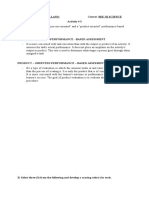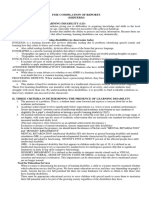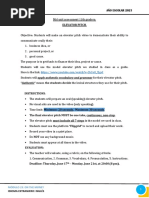Module 1 Learning Principles
Uploaded by
Angela AgonosModule 1 Learning Principles
Uploaded by
Angela AgonosMODULE 1 (Lesson 1-6)
Learning Principles associated to Cognitive, Metacognitive, Motivational, And Affective Factors
Angela Agonos BSEd II-C Science
Give the meaning of the following words
1. Cognitive
- Cognitive is the science of how we think. It’s concerned with our inner mental processes
such as attention, perception, memory, action planning, and language. Each of these
components are pivotal in forming who we are and how we behave.
2. Metacognitive
- Metacognition is a deeper level of thinking that includes your ability to think about your
thinking; how you understand, adapt, change, control, and use your thought processes.
3. Affective
- Affective is a word that crops up a lot in psychology—it means having to do with emotions
or moods. Affective disorders are characterized by mood swings.
4. Motivation
- Motivation is a driving factor for actions, willingness, and goals. These needs, wants or
desires may be acquired through influence of culture, society, lifestyle, or may be generally
innate. An individual's motivation may be inspired by outside forces (extrinsic motivation) or
by themselves (intrinsic motivation).
Reflection Activities and Review Exercises
1. Explain cognitive, metacognitive, motivation and affective factors of psychological learner-
centered principle of learning in your own words. Cite at least two classroom situations that
apply two principles of these factors.
- Cognitive and metacognitive factors of psychological learner-centered principle of learning
involves learning strategies and cognitive skills like construction of knowledge. Learning is
influenced by environmental factors, including culture, technology, and instructional
practices. The classroom environment, particularly the degree to which it is nurturing or not,
can also have significant impacts on student learning.
- Motivation and affective factors of psychological learner-centered principle of learning
influence both the quality of thinking and information processing as well as an individual's
motivation to learn. It can be influenced by the individual's emotional states, beliefs,
interests and goals, and habits of thinking. The learner's creativity, higher order thinking,
and natural curiosity all contribute to motivation to learn.
-
2. Why is it important for becoming teachers to be aware of the learner-centered psychological
principles for school reform?
- Being aware of learner-centered psychological principles provide a framework for
developing and incorporating the components of new designs for schooling. These
principles emphasize the active and reflective nature of learning and learners. In this way
learners/ student will benefit this kind of approach like improve participation, retention of
knowledge and develops problem solving skills.
3. Do you think that the length of service in teaching guarantees effectiveness in implementing
the learner-centered principles? Defend your answer.
- Length of service in teaching is an advantage in implementing it but for some it cannot
guarantee effectiveness since teachers uses different method and strategies on how to
implement learning-centered principles because implementing LCP requires commitment
in time and effort. Effective teaching involves acquiring relevant knowledge about students
and using that knowledge to inform our course design and classroom teaching. When we
teach, we do not just teach the content, we teach students the content.
4. Make a matrix or table of differences between novice and expert learners.
Novice Learner Expert Learner
Attempt to process all information they Select important information to process:
receive able to breakdown information to
manageable chunks
Satisfied at just scratching the surface; First, try to understand the problem, look
hurriedly gives a solution to the problem for boundaries, and create a mental picture
of the problem
Have limited knowledge in the different Have deeper knowledge in different subject
subject areas areas because they look for
interrelationships in the things, they learn
Do not examine the quality of their work Check their errors and redirect their efforts
nor stop make revisions to maintain quality output
You might also like
- I. Activities/Assessment:: Activity 1: Assessment Scenarios (3 Points Each)100% (3)I. Activities/Assessment:: Activity 1: Assessment Scenarios (3 Points Each)13 pages
- LESSON 2 Roles of Educational Technology in LearningNo ratings yetLESSON 2 Roles of Educational Technology in Learning14 pages
- Learning Outcomes: Performance-Based TestNo ratings yetLearning Outcomes: Performance-Based Test7 pages
- Rizza Mermejo - Activity Sheet Lesson 10 Stakeholders in The Curriculum ImplementationNo ratings yetRizza Mermejo - Activity Sheet Lesson 10 Stakeholders in The Curriculum Implementation1 page
- Article-3-Collaborative Strategic Reading-On The Road To Successful English Language ReadersNo ratings yetArticle-3-Collaborative Strategic Reading-On The Road To Successful English Language Readers4 pages
- The National Competency-Based Teacher Standards (NCBTS)No ratings yetThe National Competency-Based Teacher Standards (NCBTS)19 pages
- Name: Jocelyn O. Millano Course: Bse Iii Science Activity # 3100% (1)Name: Jocelyn O. Millano Course: Bse Iii Science Activity # 33 pages
- Danizelle Kaye Bernardo - Classwork # 5 Affective AssessmentNo ratings yetDanizelle Kaye Bernardo - Classwork # 5 Affective Assessment1 page
- Cal/ Cale/ Calm Performance-Based AssessmentNo ratings yetCal/ Cale/ Calm Performance-Based Assessment24 pages
- Joshua Lagonoy - Outcomes Based Assessment 2No ratings yetJoshua Lagonoy - Outcomes Based Assessment 21 page
- Bloom's Taxonomy: The Affective Domain: Cognitive PsychomotorNo ratings yetBloom's Taxonomy: The Affective Domain: Cognitive Psychomotor10 pages
- Educational Technology in The Asia Pacific RegionNo ratings yetEducational Technology in The Asia Pacific Region4 pages
- The Philosophical Heritage - Teaching Profession76% (17)The Philosophical Heritage - Teaching Profession2 pages
- Field Study 6: Angelica Anches Anna Mae NabuaNo ratings yetField Study 6: Angelica Anches Anna Mae Nabua5 pages
- PCK 304 W3 Understanding The Lesson 2 (Lyka)No ratings yetPCK 304 W3 Understanding The Lesson 2 (Lyka)2 pages
- Theory 2: Facilitating Learning: Activity 1No ratings yetTheory 2: Facilitating Learning: Activity 13 pages
- Lesson 21 Century and The Rise of New Literacies: DebateNo ratings yetLesson 21 Century and The Rise of New Literacies: Debate25 pages
- Motor Imaging Strategy On Students' Vocabulary in Reading ComprehensionNo ratings yetMotor Imaging Strategy On Students' Vocabulary in Reading Comprehension19 pages
- Kasus Perubahan Dalam Perusahaan Keluarga: PT. Solo Jaya67% (3)Kasus Perubahan Dalam Perusahaan Keluarga: PT. Solo Jaya10 pages
- 1.1. Meaning and Definition of Jurisprudence100% (1)1.1. Meaning and Definition of Jurisprudence22 pages
- Leson 6 (Building A Strong and Long Lasting Marriage) PDFNo ratings yetLeson 6 (Building A Strong and Long Lasting Marriage) PDF9 pages
- Preliminary Examination in Effective Communication and Public SpeakingNo ratings yetPreliminary Examination in Effective Communication and Public Speaking6 pages
- Effectiveness of Metacognition-Based Reading Enrichment ProgramNo ratings yetEffectiveness of Metacognition-Based Reading Enrichment Program10 pages
- QwikResume - Your Guide To Perfect Resume Assistant Site ManagerNo ratings yetQwikResume - Your Guide To Perfect Resume Assistant Site Manager3 pages
- Menghindari Plagiasi Dan Menuliskan Sitasi Dengan Baik: Cientifc Paper .No ratings yetMenghindari Plagiasi Dan Menuliskan Sitasi Dengan Baik: Cientifc Paper .22 pages
- Compound Personality Adjectives Teacher NotesNo ratings yetCompound Personality Adjectives Teacher Notes2 pages
- Schwartz Consciousness Spirituality and Postmaterialist ScienceNo ratings yetSchwartz Consciousness Spirituality and Postmaterialist Science14 pages
- Youthtopias: Towards A New Paradigm of Critical Youth Studies A.A. Akom, Julio Cammarota, and Shawn GinwrightNo ratings yetYouthtopias: Towards A New Paradigm of Critical Youth Studies A.A. Akom, Julio Cammarota, and Shawn Ginwright30 pages

























































































